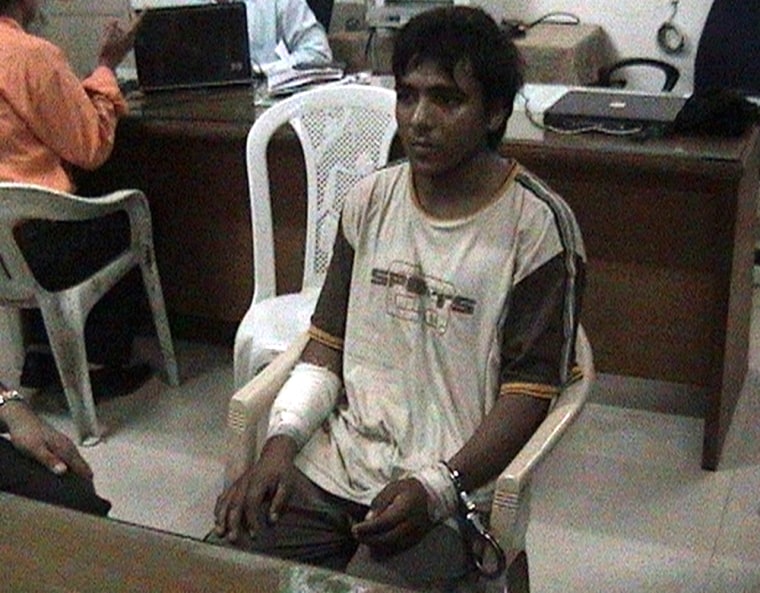The lone surviving gunman in the Mumbai attacks pleaded guilty Monday and gave a detailed account of the plot and his role in the rampage that left 166 people dead and paralyzed the city for three days.
The confession was a big boost to India's claims that terrorist groups in Pakistan were behind the attack, and that Islamabad was not doing enough to clamp down on them. Pakistan has acknowledged the Mumbai attacks were partly plotted on its soil, severely straining relations between the nuclear-armed archrivals.
In a verbal statement, Ajmal Kasab described his group's journey from Karachi, Pakistan on a boat, their subsequent landing in Mumbai on Nov. 26, and his assault on a railway station and a hospital with a comrade he identified as Abu Ismail.
The other gunmen, also armed with automatic rifles and grenades, attacked a Jewish center and two five-star hotels, including the Taj Mahal. The rampage ended at the historic hotel days later after commandos killed the attackers holed up there.
"I was firing and Abu was hurling hand grenades (at the railway station)," Kasab told the court. "We both fired, me and Abu Ismail. We fired on the public."
Earlier Kasab, 21, stood up before the special court hearing his case just as a prosecution witness was to take the stand and addressed the judge. "Sir, I plead guilty to my crime," he said, triggering a collective gasp in the courtroom.
The statement was recorded and signed by Kasab, formally reversing his plea from innocent to guilty in the trial that started April 17.
From shop assistant to terrorist
Kasab told the court he worked as a shop assistant in Jhelum town in Pakistan. Unhappy with the low wages he and a colleague named Muzzafar went to Rawalpindi city with the intention of becoming professional robbers, he said.
While attending a festival in Rawalpindi, they approached some men with long beards, correctly guessing they were Islamic radicals who could provide them weapons for robberies. The bearded men put them in touch with Lashkar-e-Taiba, which gave them weapons training, he said.
Before coming to India, Kasab said he lived in a house in Karachi for 1 1/2 months with 10 other young men. All of them were transferred to another home and taken to sea where they met four handlers. One of them was an Indian named Abu Zundal, he said.
After attacking the railway station and hospital, Kasab said he and Ismail drove to a nearby beach in a hijacked vehicle. He was later captured by police after a shootout in which Isamil was killed. He was treated for wounds and has since been held in solitary confinement in a Mumbai jail.
Kasab said his confession was not coerced. "There is no pressure on me. I am making the statement of my own will," he said.
Reason behind confession
Asked by judge M.L. Tahiliyani why he confessed now after consistently denying his role, Kasab said it was because the Pakistani government recently acknowledged he was a Pakistani citizen, dealing a blow to his defense.
"If Pakistan has accepted me as its citizen, then end this case and punish me for my crime," he said. "My request is that we end the trial and I be sentenced."
Tahiliyani said no immediate judgment would be issued and the trial will resume Tuesday.
Pakistan Foreign Ministry spokesman Abdul Basit declined to comment on Kasab's court admission.
A total of 166 people were killed in the attacks by 10 gunmen in Mumbai, India's financial capital. It ended with troops storming the Taj Mahal Hotel where some gunmen were holed up.
Kasab's dramatic statement took those at the hearing by surprise.
"Everybody in the court was shocked the moment he said he accepts his crime. It was unexpected," public prosecutor Ujjwal Nikam said. "We have finally extracted the truth."
"Everyone is surprised. I am also surprised," said defense lawyer Abbas Kazmi.
Pakistan probes militant groups
Monday's development came days after Pakistan gave a dossier to India with details of its investigation into the terrorist groups that New Delhi claims were responsible.
Late last month the special court also issued arrest warrants for 22 Pakistani nationals accused of masterminding the attacks. India blames Pakistan-based Islamist militant group Lashkar-e-Taiba.
The founder of the group, Hafiz Mohammed Saeed, was arrested with two other senior figures by Pakistani authorities in December.
A court in the eastern Pakistani city of Lahore freed Saeed, a hard-line Islamic cleric, in June saying there was no evidence against him. The federal government will appeal the verdict.
In his statement Monday, Kasab did not name Saeed although he had described him as a conspirator during interrogation.
Ashok Chavan, the chief minister of Maharashtra state of which Mumbai is the capital, congratulated the prosecution team and said "the court should give the maximum punishment" to Kasab.
More on Mumbai
